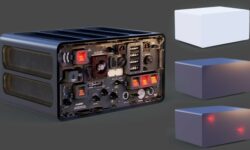V-Ray 5 for 3ds Max Essential Training
Release date:2021, February 26
Author:Brian Bradley
Skill level:Beginner
Language:English
Exercise files:Yes
Get up and running with the V-Ray 5 rendering engine inside 3ds Max. In this course, instructor Brian Bradley shows how to extend the range of 3ds Max using the many state-of-the-art tools and features found in this, the fifth version of the powerful rendering solution. Brian kicks off the course by covering several new tools included in V-Ray 5, including the Lighting Analysis tool and the Viewport IPR. He then dives into critical V-Ray concepts, including materials, image sampling, maps, and lighting, as well as how to create in-camera effects such as depth of field and motion blur. Brian also shows how to easily add lifelike effects to your 3D models using FX tools such as VRayFur.





 Channel
Channel





